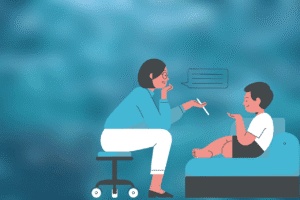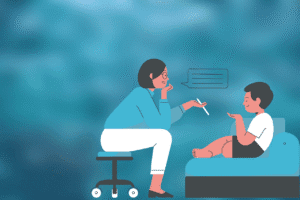Recognizing the Early Signs of Adolescent Depression
Back to Blog
Understanding Adolescent Depression
Adolescent depression represents a significant mental health concern affecting a substantial number of teenagers today. Defined as a state of persistently low mood and a lack of interest in activities, adolescent depression differs from adult depression in several ways, particularly regarding symptoms and coping mechanisms. For instance, where adults may recognize and articulate their feelings of sadness, teenagers often express their struggles through behavioral changes, irritability, and withdrawal from social interactions.
The prevalence of this condition is alarming, with research indicating that roughly 20% of adolescents experience depression before reaching adulthood. The adolescent years are a time of critical emotional and psychological development, making prompt recognition and intervention vital. Factors contributing to this increased risk include hormonal changes, academic pressures, social challenges, and the impact of technology on interpersonal relationships. These elements can complicate a teenager’s emotional landscape, potentially leading to feelings of despair or hopelessness.
It is important for parents and guardians to be attentive to any signs that their teenager may be struggling with depression. As a parent, phrases such as “my teenager is making me depressed” may emerge, illustrating the reciprocal nature of emotional distress within families. Early identification can facilitate access to necessary resources, such as a “teenage depression therapist near me,” which can provide much-needed support and guidance. Furthermore, a “manic depression test teenage” can assist in evaluating symptoms to determine appropriate treatment methods. Therapy for teenage depression near me can be an effective approach, fostering healthy coping strategies and emotional resilience.
Being aware of the unique challenges associated with adolescent depression allows for proactive engagement in a teenager’s mental health journey. Prioritizing early intervention not only aids in reducing the severity of symptoms but also enhances the likelihood of a more positive long-term outcome.
Common Symptoms of Depression in Adolescents
Adolescence is a critical developmental stage during which young individuals may experience a variety of emotional challenges, including adolescent depression. Recognizing early signs is crucial for timely intervention. One of the most common symptoms of depression in teenagers is persistent sadness. Teens may often exhibit an overwhelming sense of hopelessness or despondence that can seem disproportionate to their circumstances. This emotional state frequently manifests as irritability. A teenager who previously displayed a cheerful demeanor may suddenly become easily agitated or prone to outbursts, leaving parents or guardians bewildered and concerned, wondering, “why is my teenager making me depressed?”
Changes in appetite and sleep patterns often accompany these emotional symptoms. For some adolescents, depression may lead to significant weight loss due to a lack of appetite or, conversely, excessive eating as a means of coping with their emotions. Sleep disturbances are also prevalent; adolescents might struggle with insomnia or have an inclination to oversleep, which can exacerbate their feelings of lethargy and disinterest in daily activities. A noticeable decline in personal hygiene and self-care may reflect the overwhelming nature of their experiences.
Another common indicator of adolescent depression is the loss of interest in activities that were once enjoyed. A teenager may suddenly withdraw from friends, family, or previously cherished hobbies. For instance, a once-enthusiastic student athlete might stop participating in their sport entirely, resulting in parental concern and the need for a teenage depression therapist near me. Effective therapy for teenage depression can provide the necessary support and coping mechanisms to navigate these challenging emotions.
In conclusion, understanding these symptoms is essential for parents, educators, and peers in order to provide support and seek appropriate help when necessary. Depression in adolescents is complex, but early recognition can lead to effective interventions and improved outcomes.
Behavioral Changes to Watch For
Adolescent depression can manifest in various behavioral changes that may be subtle yet significant indicators of a mental health condition. One of the first signs to observe is a noticeable withdrawal from social circles. Teenagers who were once active participants in family gatherings or peer group activities may become increasingly isolated. This isolation can be particularly concerning if accompanied by a disinterest in previously enjoyable activities. Parents and guardians should pay attention if their teenager’s friends seem to dissipate or if they express a desire for solitude rather than engagement with peers.
Another critical aspect to monitor is any shift in academic performance. Teens struggling with depression may experience difficulties concentrating, resulting in deteriorating grades or missed assignments. If a teenager’s performance in school declines without a clear explanation, it may signal underlying emotional struggles. Parents might hear phrases such as “my teenager is making me depressed” as they grapple with their child’s changing behavior, emphasizing the strain that arises from such situations.
Substance abuse is another alarming behavior that can signal adolescent depression. As some teenagers attempt to cope with their emotions, they may turn to alcohol or drugs as a means to escape. This can lead to a cycle of risky behaviors that further complicates their mental health state. Additionally, engaging in risky behaviors, such as reckless driving or unsafe activities, should raise red flags for caregivers. Seeking “therapy for teenage depression near me” or looking for a “teenage depression therapist near me” could be crucial steps in addressing these warning signs. Recognizing these behavioral shifts early on is essential, as they can provide insight into a teenager’s emotional well-being.
In conclusion, being aware of these behavioral changes is vital for parents and caregivers. The earlier signs of adolescent depression are recognized and addressed, the better the prospects for recovery and support can be. Understanding the nature of these shifts can guide the necessary steps toward professional intervention and nurturing an environment of open communication.
Emotional Indicators of Depression
Adolescent depression can manifest through various emotional indicators that significantly impact a teenager’s behavior and mental well-being. One prominent signal is a pervasive sense of hopelessness. A teenager who frequently expresses feelings such as, “my teenager is making me depressed,” may indicate a deeper emotional struggle. This sentiment reflects not only their own inner battle but possibly an overwhelming sense of despair about their circumstances, relationships, or future prospects.
Alongside hopelessness, feelings of worthlessness often accompany adolescent depression. Teenagers may begin to view themselves as inadequate or fall short of expectations, leading to excessive guilt over perceived failures or shortcomings. These feelings can be detrimental, compounding their emotional turmoil and causing them to withdraw from activities or social interactions they once enjoyed. When considering resources like a “teenage depression therapist near me,” it is vital to address these feelings head-on, as they contribute significantly to a teen’s overall mental health.
Moreover, adolescents may exhibit rage or anger as a reaction to their internal struggles. This emotional volatility can manifest as irritability or unexplained outbursts, complicating relationships with peers and family members. It is essential to understand that these feelings are often rooted in an inability to manage their emotions effectively. Consequently, parents and caregivers should remain vigilant for signs that their teenager might be experiencing these emotional indicators, especially if they present as extreme or out of character for the adolescent.
Recognizing these emotional indicators of depression allows for early intervention and support. Seeking therapy for teenage depression near me or engaging in open conversations about emotional health can help adolescents navigate through their challenges, ultimately promoting resilience and emotional well-being.
Physical Signs and Health Impact
Adolescent depression often manifests not only through emotional and cognitive challenges but also through various physical signs that can significantly affect overall health. Teenagers experiencing depressive symptoms may frequently report feeling fatigued, even after a full night’s sleep. This persistent tiredness can hinder their ability to engage in daily activities, schoolwork, and social interactions, potentially exacerbating feelings of isolation and hopelessness.
In addition to fatigue, adolescents struggling with depression may suffer from unexplained physical ailments, such as chronic headaches or stomachaches. These symptoms can be dismissively attributed to stress or anxiety, yet they may serve as indicators of underlying mental health issues. It is not uncommon for parents to express feelings of distress, stating, “my teenager is making me depressed” when faced with these complexities. Understanding that physical discomfort can be a somatic expression of emotional distress is crucial for families navigating adolescent depression.
The interplay between mental and physical health can also have serious repercussions. For instance, when a teenager experiences chronic pain or debilitating fatigue linked to depression, it can lead to a cycle of worsening mental health. Furthermore, untreated depression may result in a reduced immune response, making adolescents more susceptible to illnesses. This connection highlights the importance of seeking appropriate support, such as therapy for teenage depression near me or consulting a teenage depression therapist near me for guidance in addressing these intertwined issues.
Recognizing these physical signs is essential for early intervention. By fostering an open dialogue about emotions and health, parents and guardians can aid adolescents in seeking professional help, ultimately improving their overall well-being and mitigating the impact of adolescent depression.
The Role of Social Media in Adolescent Depression
In today’s digital age, social media has become an integral part of adolescent life, significantly influencing their experiences and emotions. Numerous studies indicate that excessive exposure to social media can contribute to the onset of adolescent depression. One of the key factors is the tendency for teenagers to engage in constant comparisons with their peers. Through curated images and status updates, adolescents may perceive others as leading more fulfilling lives, leading them to feel inadequate or inferior. This phenomenon often cultivates a sense of failure and discouragement among vulnerable teens, exacerbating already existing feelings of sadness or isolation.
Moreover, cyberbullying has emerged as a prevalent issue on social media platforms, further heightening the risks associated with adolescent depression. Teens may face harassment and derogatory remarks from peers, which can leave profound emotional scars. Unlike traditional bullying, cyberbullying can follow adolescents into their homes, making it difficult for them to find respite. Victims of such bullying may experience increased isolation, as the digital world becomes a source of pain rather than support. The pervasive nature of online attacks can create an environment where depression can thrive, often resulting in the need for professional intervention.
However, it’s important to recognize that social media can also have a positive role in supporting mental health. Many adolescents use online platforms to connect with peers who share similar experiences, providing a valuable sense of community and understanding. Online support groups can offer resources and advice, sometimes addressing queries such as “my teenager is making me depressed” or “how can I find a teenage depression therapist near me?” By fostering these connections, social media can serve as a double-edged sword; it holds the potential to bolster resilience but can simultaneously deepen the feelings of despair in those who are susceptible to adolescent depression.
In conclusion, it is essential for parents and caregivers to monitor their teenager’s social media usage and encourage open discussions about their online experiences. This balanced approach may help mitigate the adverse effects of social media while promoting mental well-being.
Cultural and Environmental Factors
Adolescent depression is often influenced by a variety of cultural and environmental factors. Within the family dynamic, the structure, communication patterns, and emotional support systems play a significant role in shaping a teenager’s mental health. Families that foster open communication typically create an environment where adolescents feel safe expressing their feelings, his reduces the risk of developing issues such as depression. Conversely, a lack of support from parents or guardians can exacerbate feelings of isolation and helplessness, ultimately leading to symptoms of adolescent depression.
Socio-economic status also critically impacts adolescent mental health. Teenagers from lower socio-economic backgrounds may experience heightened stress due to financial instability, which can contribute to feelings of depression. These stressors might include worries about basic needs, such as food and shelter, as well as the pressure to succeed academically despite financial constraints. Furthermore, academic pressures, including the need to maintain high grades and prepare for college, can overwhelm many teenagers, leading to symptoms of anxiety and symptoms consistent with adolescent depression.
Cultural expectations additionally contribute to the prevalence of depressive symptoms in youths. Different cultures have varying expectations for behavior, performance, and emotional expression, which can foster a sense of inadequacy among adolescents who struggle to meet these standards. For instance, in cultures that prioritize academic excellence, a teenager may experience significant pressure, leading to feelings of failure if they do not excel, increasing the risk of depressive symptoms. Recognizing these cultural and environmental influences is essential in understanding the intricacies facilitating mental health challenges among adolescents.
Ultimately, acknowledging the relationship between cultural and environmental factors and adolescent depression can help identify at-risk individuals, aiding in the search for appropriate therapy for teenage depression near me, or connecting them with resources like a teenage depression therapist near me. Understanding the context of these factors empowers parents and educators to respond effectively to signs of distress in teenagers.
Communicating Concerns with Adolescents
Effective communication with adolescents, particularly those who may be experiencing symptoms of depression, is vital for their emotional well-being. Parents, guardians, and educators should employ strategies that foster open discussions, allowing teenagers to express their feelings and concerns. One of the most critical aspects of this process is practicing empathy. Demonstrating understanding and compassion can create a safe space for adolescents to share their struggles. When broaching the subject, it is important to approach conversations without judgment. Phrasing questions in a supportive manner, such as starting with “I’ve noticed you seem a bit down lately,” can encourage teenagers to open up about their feelings.
Active listening is another essential component of effective communication. Parents and guardians should practice being fully present in conversations, focusing not only on the words spoken but also on the emotions conveyed. This involves pausing to allow the adolescent to share their thoughts without interruption, validating their feelings by acknowledging their experiences. For instance, if a teenager expresses feelings of sadness or frustration, responding with phrases like “It’s understandable to feel that way” can help them feel heard and recognized, potentially alleviating feelings of isolation.
Moreover, it is crucial to ask open-ended questions that promote elaboration, such as “What has been bothering you lately?” or “Can you tell me more about how you’ve been feeling recently?” This not only provides an opportunity for deeper insight but also demonstrates genuine interest in their well-being. For those parents worried that their teenager might be demonstrating clear signs of adolescent depression, or if their teenager states, “my teenager is making me depressed,” initiating these conversations can be a proactive measure. Seeking professional help, such as finding a teenage depression therapist or exploring therapy for teenage depression near me, may also be necessary to ensure that the adolescent receives adequate support.
In conclusion, recognizing the symptoms of teenage depression and fostering a communicative relationship with adolescents can significantly improve their mental health outcomes. By employing empathetic communication, active listening, and open-ended questions, caregivers can encourage teenagers to discuss their feelings and seek help when needed.
When to Seek Professional Help
Recognizing the signs of adolescent depression in your teenager is the first step towards facilitating a supportive environment. However, it is equally important to know when to seek professional help. If you observe significant changes in your teenager’s behavior, such as prolonged sadness, withdrawal from family and friends, or a noticeable decline in academic performance, it may be indicative of a deeper issue. In such cases, it is essential to consider that “my teenager is making me depressed” might not be just a fleeting phase but a serious mental health challenge that requires intervention.
Professional help should be sought if your adolescent expresses feelings of hopelessness, experiences drastic mood swings, or engages in self-destructive behaviors. These can be signs of not just depression, but possibly other mental health disorders, which call for immediate attention. It’s crucial to consult a qualified therapist who specializes in teenage mental health to address these concerns effectively. Searching for “therapy for teenage depression near me” can help you locate a suitable therapist or counselor who can provide tailored support for your adolescent.
Moreover, taking a proactive approach to mental health can dramatically improve outcomes. Utilizing tools such as a “manic depression test teenage” may assist parents in determining the urgency of getting their child evaluated. Seeking out local support groups and resources can also provide both your teenager and your family with the necessary tools to cope with depression. Finding a therapist or a support group that understands the unique challenges faced by adolescents is paramount.
In conclusion, early intervention is crucial in addressing adolescent depression. By recognizing the signs and seeking professional help promptly, parents can facilitate a supportive framework that encourages healing and resilience in their teenagers. This proactive engagement can ultimately make a significant difference in the emotional well-being of the young individual.




Leave a Reply